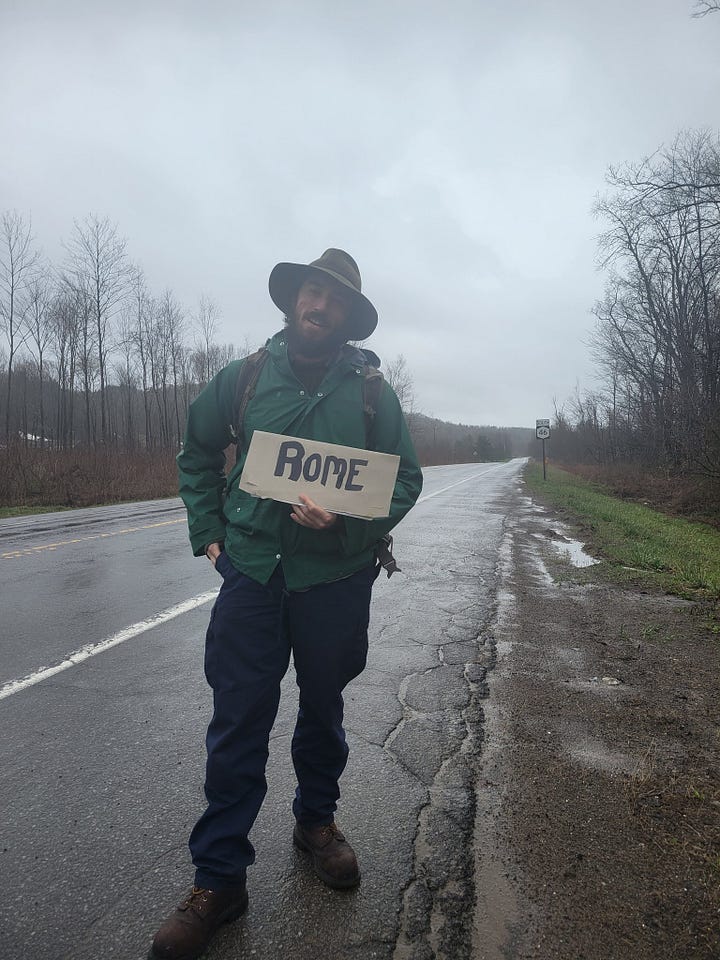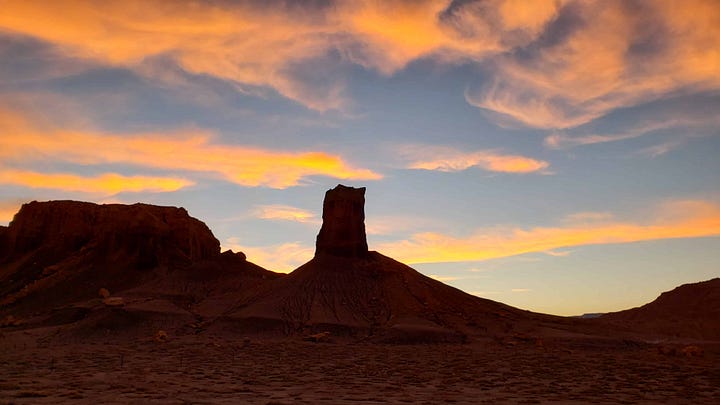The principle is extremely simple. A motorist speeds down the highway, traveling wherever he wishes, and he virtually always has extra space in the vehicle which is not being put to any use. Empty seats or truck-beds or even trunk space, open laps of passengers or voids between legs on the floors of passenger vans or buses — virtually always, if he is motivated, a driver can fit another passenger and his meagre belongings into his vehicle if he wishes. The hitchhiker, knowing this, raises his thumb to signal that he would like a ride, and expresses his wish on an entirely voluntary basis. His thumb says, in effect, "if you've got the room in your vehicle, and you'd like to share it with me, it would be a very nice thing."


While I've known many traveling men who took to begging for money — a practice I have always despised and have only ever engaged in rare cases of extreme desperation — there's something markedly different about the hitchhiker's solicitation for a ride. For the panhandler asks to take from his benefactor in plain numerical terms; the dollar that he may goad from any who pass the spot where he plies his dismal trade is subtracted from his patron and added to his own pocket. His request is often loaded; the rhetoric of his mumblings or his cardboard sign or even the wordless rhetoric employed by the shaking of his change-cup are often imbued with moral judgements."Be kind," his sign might say, implying that those who do not donate to his cause — dubious as it may be — are quite the opposite of kind. Therefore, in passing the panhandler, one either complies with his insistent plea for a dollar, or passes by in a state of quiet outrage against the one who wishes to goad his fellow man into giving him something for nothing. Or, oftener still, perhaps, he is simply passed by with a cold numbness which can lend a city street a sad, heavy quality over time — and his presence is slowly reviled.
The panhandler's station is not always so cynical, of course — now and again I have met panhandlers for whom their efforts were strictly necessary for one reason or another, and the charity of the public is for whatever reason well-placed in their cases. I have known others still who were funny, encouraging, entertaining in at least some regard, ascending to the status of a beloved neighborhood character — a luxury for whom at least a few local residents are more than happy to subsidize. But in so many instances, there is something darkening, manipulative, and sad in the beggar's bleak province. And though the hitchhiker makes his request of passers-by in a manner that can frequently look no different from those of the panhandler, his efforts are quite different, as they ultimately subtract nothing from those who offer them a ride.
In fact, often enough, the hitchhiker not only fails to take anything from his patron in real quantitative terms — he also may manage to give him something in the way of a service. A man may pull over for the hitchhiker and say something like "I've been driving for twenty-two hours — please talk to me to keep me awake," and so the hitchhiking man must discourse to him however he can, passionately and loudly, poling the conversation along by any means he can, provoking him gently with stories and high-flying ideas lest his red-eyed driver should fall asleep behind the wheel. Or, a driver may say "tonight, after 38 years of marriage, my wife asked for a divorce," or "I have been terribly lonely for my entire life," and the hitchhiker must play the role of the confidant and comrade, hearing confessions and shattered hopes and bearing the burdens of those who wander the American highways listlessly or drained of all cheer.
Still others find in a hitchhiker an opportunity for great mirth and gladness, for "good karma" or the wholesome thrill of "paying it forward". Former hitchhikers may have vowed years ago to return the favor of good will and fraternal trust along this country's highways; others who've never once hitchhiked simply want to share a meal, or a beer, or a long conversation which — if the hitchhiker is really a professional — may end with the phrase: "thank you for riding with me tonight," or better still, "you have restored my faith in humanity" or "you have reminded me that at bottom, most people are good people."
Once, I even had the opportunity to save a life. Out in the mind-bending rock formations of Interstate 70 between Grand Junction, Colorado and Green River, Utah, I was once scooped by a thirtysomething man who smiled as I entered his new, clean Honda. He was cheery and convivial, chatting quite blithely as we rounded the bends around arroyos and purple-tinged cuestas of salty sand and barren earth — until he "broke" and was weeping desperately on the other side of five minutes. "I must confess to you that I never pick up hitchhikers," he said through bitter tears, red-faced, the veins on his neck protruding in a heinous portrait of years of quiet grief and anguish.
I asked him why, then, he'd gone and picked me up. He answered with utmost seriousness, as if declaring an incontrovertible fact from an a supreme and indisputable authority: "Because tonight, I am going to shoot myself. My grandfather's pistol is in the trunk — I am going to do it just outside of Arches National Park."
By this time, I was a fairly seasoned hitchhiker and had contended with my share of strangeness along the road, learning to default to a stoic, non-reactive posture in encountering any strange or untoward thing — from confessions of pedophilia and infidelity to sexual propositions, or the driver's unexpected hits off the meth pipe. The man's admission of his suicidal intention here amid the magma-like hues of the setting desert sun was not even my first — I had seen this before. But his particular case was completely gripping; where others I'd met who'd expressed suicidal ideation on former hitchhiking rides seemed vaguely wry or ironical, or perhaps to be engaging in a sad bit of theatrical puffery — I knew this man was absolutely certain that he would pull the trigger soon. When he said "I picked you up that I may die with one last good deed on my heart before I leave the world," the hair on the back of my neck stood up straight, and the pure adrenaline common to all mammals in harrowing situations flooded into the pit of my stomach.


I had no intentions of "talking him down" or employing the platitudes of therapeutic language, knowing quite well that such talk is the last thing any desperate person actually wishes to hear. The "if this, then that" logic of computers and doctors and mechanics is often the very thing that has sucked the humanity whole from the soul of a man — and while it may manipulate a desperate human being out of committing the ultimate mortal act, such tactics have always seemed to be devoid of love and therefore incapable of filling the void from which such dark ideations spring. All I said was — "tell me the whole story. I want to listen." And he began.
And what began as a series of brief utterances between torrential cloudbursts of tears and sobs grew into a passionate discourse. His entire biography flowed out of his mouth; his every heartbreak and the memory of every sleight and failure and dashed hope, and the good memories came soon after these. Tears came atop tears, clouding his vision so thoroughly that he could hardly drive and more than once pulled the car over onto the shoulder to catch his breath. In time, we were at an empty rest area, watching the final rays of the sun die in a symphony of heavenly light which sprawled over the ocean-like void of the desert floor — a death whose blow is softened by the knowledge that it will be born again tomorrow in the east. The sun's daily luxury of reincarnation separates him from man in the most radical sense — for man to take his own life, he has no promise of rising again the following morning, in the east or anywhere, except in the form of a memory and in the bitter tears of those who had ever held him in their hearts. And in time I was waxing poetic on this very subject to him, sitting at the edge of his Honda's trunk, watching the flame of my campstove rise in the darkness as I boiled coffee for the both of us.
We talked all night long, observing the purest vistas of the galaxies above that two men could hope to secure nearly anywhere in the North American continent. We climbed atop gigantic stones to sit, we made a pot of beans, we traded life stories unabridged — and as if no time had passed at all, the sun rose in the east, and I saw the man was laughing a wholehearted, childlike laugh. Something had come back into him; though I could not tell whether it was genuine or borne of sleepless, desperate mania.
"Give me the bullets," I finally said,



